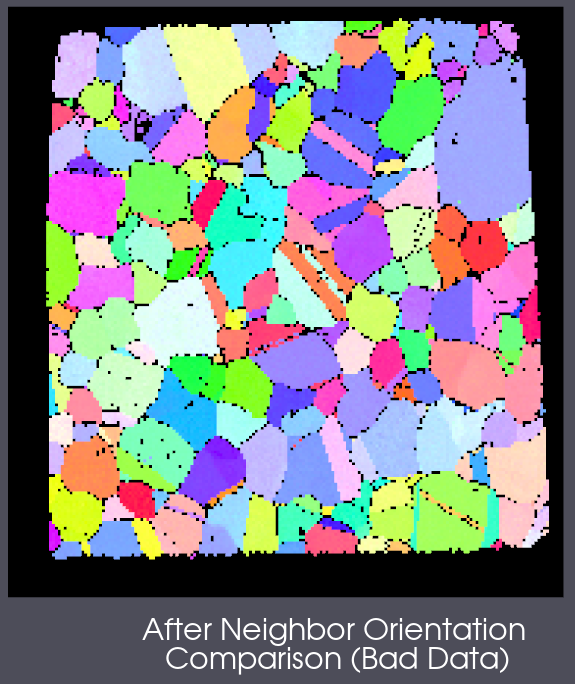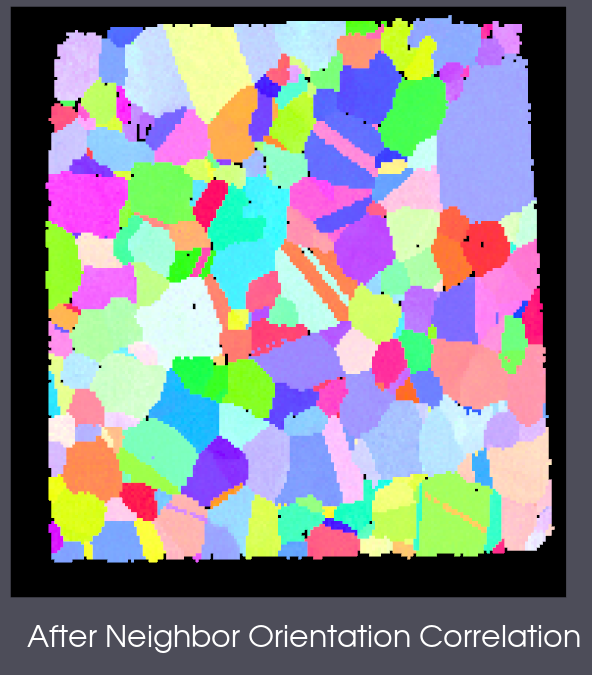10.35. Neighbor Orientation Correlation
Group (Subgroup)
Processing (Cleanup)
Description
This filter first identifies all cells that have a Confidence Index below the minimum set by the user. Then, for each of those cells, their neighboring cells are checked to determine the number of neighbor cells with orientations different than the reference cell by more than the user defined Misorientation Tolerance. In addition the neighboring cells are compared with each other to determine the number of neighboring cells that have the same orientation (again within the user defined tolerance). The Cleanup Level set by the user is then used to determine which cells are replaced. If a level of 5 is set, at least 5 of the neighboring cells must be within the same misorientation tolerance (and so on for other Cleanup Level). If a cell meets the replacement criteria, then all of its attributes are replaced with the attributes of one of the neighboring cells that are the same as each other.
Note: The filter will iteratively reduce the Cleanup Level from 6 until it reaches the user defined number. So, if the user selects a level of 4, then the filter will run with a level of 6, then 5, then 4 before finishing.
Neighbors are defined as a the “nearest neighbors” which share a “face”. For 3D structures it is 6 neighbors that share a common face with the current cell.
Schematic Example
0 |
1 |
2 |
|
|---|---|---|---|
0 |
(14.0, 0.0, 0.0) CI=0.2 |
||
1 |
(13.0, 0.0, 0.0) CI=0.2 |
(0.0, 0.0, 0.0) CI=0.05 |
(12.0, 0.0, 0.0) CI=0.2 |
2 |
(15.0, 0.0, 0.0) CI=0.2 |
Schematic layout of the neighboring cells. Only the In-Plane neighbors are shown.
In this example, cell (1,1) has a confidence index < 0.1 and the surrounding cells all have a misorientation tolerance not greater than 5 degrees. Comparing cell (1,1) with its neighbor cells we can see that the misorientation is greater than 5 Degrees. In this case the central cell (1,1) would have all of its attributes replaced with the “best” neighbor based on the phase of a neighbor cell matching the central cell.
Example Data
Example Input/Output Images |
|---|
|
The Small IN100 data just after some intial cleanup filters have been used. |
|
The Small IN100 data just after running this filter with a Misorientation Tolerance of 5 degrees, and a Cleanup Level of 2 and a minimum Confidence Index of 0.2 |
These before and after images show how this filter can be used to “fill in” data that was deemed non-indexed (in EBSD terms). The user should be careful with this filter as it is meant to clean up small sets of voxels and not flood fill an entire volume of voxels.
Warning - Cell Level Data Modification
This filter will copy all attribute data from neighboring cells into the target cell if the criteria is met.
Input Parameter(s)
Parameter Name |
Parameter Type |
Parameter Notes |
Description |
|---|---|---|---|
Minimum Confidence Index |
Scalar Value |
Float32 |
Sets the minimum value of ‘confidence’ a Cell must have |
Misorientation Tolerance (Degrees) |
Scalar Value |
Float32 |
Angular tolerance used to compare with neighboring Cells |
Cleanup Level |
Scalar Value |
Int32 |
Minimum number of neighbor Cells that must have orientations within above tolerance to allow Cell to be changed |
Input Cell Data
Parameter Name |
Parameter Type |
Parameter Notes |
Description |
|---|---|---|---|
Image Geometry |
Geometry Selection |
Image |
Path to the target geometry |
Confidence Index |
Array Selection |
Allowed Types: float32 Comp. Shape: 1 |
Specifies the confidence in the orientation of the Cell (TSL data) |
Cell Phases |
Array Selection |
Allowed Types: int32 Comp. Shape: 1 |
Specifies to which Ensemble each Cell belongs |
Cell Quaternions |
Array Selection |
Allowed Types: float32 Comp. Shape: 4 |
Specifies the orientation of the Cell in quaternion representation |
Input Ensemble Data
Parameter Name |
Parameter Type |
Parameter Notes |
Description |
|---|---|---|---|
Crystal Structures |
Array Selection |
Allowed Types: uint32 Comp. Shape: 1 |
Enumeration representing the crystal structure for each Ensemble |
Attribute Arrays to Ignore |
MultiArraySelection |
The list of arrays to ignore |
Example Pipelines
(04) SmallIN100 Presegmentation Processing
(08) SmallIN100 Full Reconstruction
INL Export
License & Copyright
Please see the description file distributed with this Plugin
DREAM3D-NX Help
If you need help, need to file a bug report or want to request a new feature, please head over to the DREAM3DNX-Issues GitHub site where the community of DREAM3D-NX users can help answer your questions.

